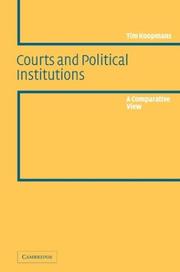| Listing 1 - 3 of 3 |
Sort by
|
Book
ISBN: 2802718274 9782802718277 Year: 2003 Publisher: Bruxelles Bruylant
Abstract | Keywords | Export | Availability | Bookmark
 Loading...
Loading...Choose an application
- Reference Manager
- EndNote
- RefWorks (Direct export to RefWorks)
Separation of powers --- Séparation des pouvoirs --- Séparation des pouvoirs
Book
ISBN: 2247053289 9782247053285 Year: 2003 Publisher: Paris Dalloz
Abstract | Keywords | Export | Availability | Bookmark
 Loading...
Loading...Choose an application
- Reference Manager
- EndNote
- RefWorks (Direct export to RefWorks)
L'arret Marbury c/ Madison de 1803 marque l'histoire constitutionnelle des Etats-Unis. La Constitution de 1787 ne prévoyait pas à l'origine de véritable contrôle de constitutionnalité des normes juridiques. La Cour suprême interprétait les lois et déterminait celle applicable à l'espèce (la loi fédérale ou la loi d'Etat). Par l'arrêt Marbury c/ Madison, la Cour, sous l'influence de son président Marshall, s'est reconnu le droit de contrôler la constitutionnalité des lois et des actes administratifs de l'executif. Ce pourvoir ainsi octroyé permet donc au gouvernement américain (par le biais de son pouvoir judiciaire), au Congès et au Président de participer activement à la fonction législative. Les actes de ce colloque offrent une vison historique, juridique et contemporaine du sujet. Les contributions de ce colloque sont rédigées pour moitié en anglais et français
Judicial review - United States - History - Congresses. --- Separation of powers - United States - History - Congresses. --- Contrôle juridictionnel des lois - États-Unis - Histoire - Congrès. --- Séparation des pouvoirs - États-Unis - Histoire - Congrès. --- Marbury, William, - 1761 or 1762-1835 - Trials, litigation, etc. - Congresses. --- Madison, James, - 1751-1836 - Trials, litigation, etc. - Congresses. --- Marbury, William, - 1761 ou 1762-1835 - Procès, instances, etc. - Congrès. --- Madison, James, - 1751-1836 - Procès, instances, etc. - Congrès. --- Judicial review --- Separation of powers --- Contrôle juridictionnel des lois --- Séparation des pouvoirs --- Marbury, William, - 1761 or 1762-1835 --- Madison, James, - 1751-1836 --- Marbury, William, - 1761 ou 1762-1835

ISBN: 0521826624 0521533996 110713806X 9786612486548 0511673817 0511675003 0511673027 0511670478 0511522258 1282486543 051167175X Year: 2003 Publisher: Cambridge Cambridge University Press
Abstract | Keywords | Export | Availability | Bookmark
 Loading...
Loading...Choose an application
- Reference Manager
- EndNote
- RefWorks (Direct export to RefWorks)
The frontier between 'law' and 'politics' is not always clear-cut. A large area exists where courts operate, but where governments and parliaments also make decisions. Tim Koopmans compares the way American, British, French and German law and politics deal with different issues: in many instances subjects which are highly 'political' in one country constitute legal issues in another. Is there, for example a 'sovereign Parliament' (as there is in Britain), or will courts control the compatibility of statutes with the Constitution (as in the United States and Germany)? How far can courts go in controlling the legality of administrative action? Are there general legal theories about the frontier between what courts and what politics can do? Koopmans considers case law on a range of issues, including human rights protection, federalism, separation of powers, equal protection and the impact of European and international law.
Comparative law. --- Courts. --- Justice, Administration of. --- Law --- Political aspects. --- Law of civil procedure --- Politics --- France --- United States --- Great Britain --- Germany --- Courts --- Justice, Administration of --- Comparative law --- Tribunaux --- Justice --- Droit et politique --- Droit comparé --- Administration --- General and Others --- Comparative jurisprudence --- Comparative legislation --- Jurisprudence, Comparative --- Law, Comparative --- Legislation, Comparative --- Law and politics --- Administration of justice --- Judiciary --- Dispute resolution (Law) --- Judicial districts --- Procedure (Law) --- Judicial power --- Jurisdiction --- Law and legislation --- United States of America --- DROIT PUBLIC COMPARE --- SEPARATION DES POUVOIRS --- POUVOIR JUDICIAIRE --- CONSTITUTIONNALITE DES LOIS --- LEGALITE DES ACTES ADMINISTRATIFS
| Listing 1 - 3 of 3 |
Sort by
|

 Search
Search Feedback
Feedback About UniCat
About UniCat  Help
Help News
News